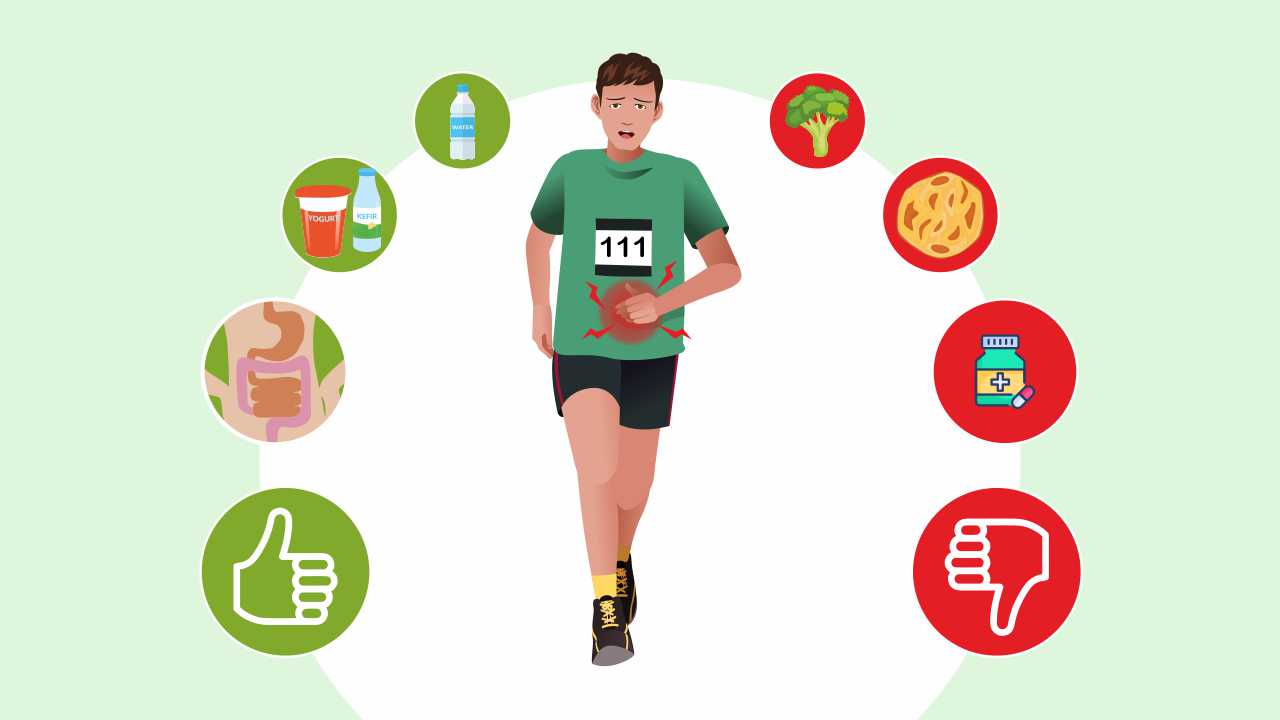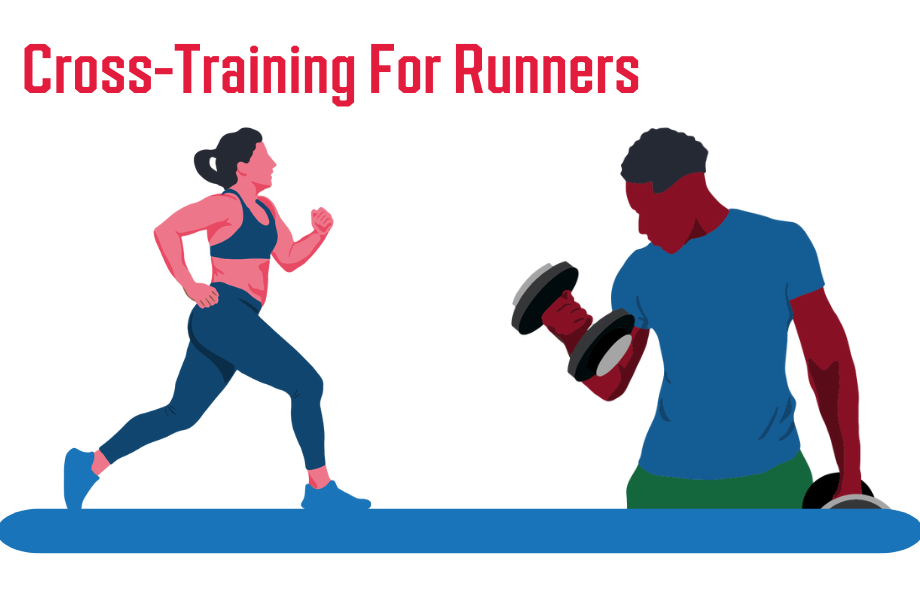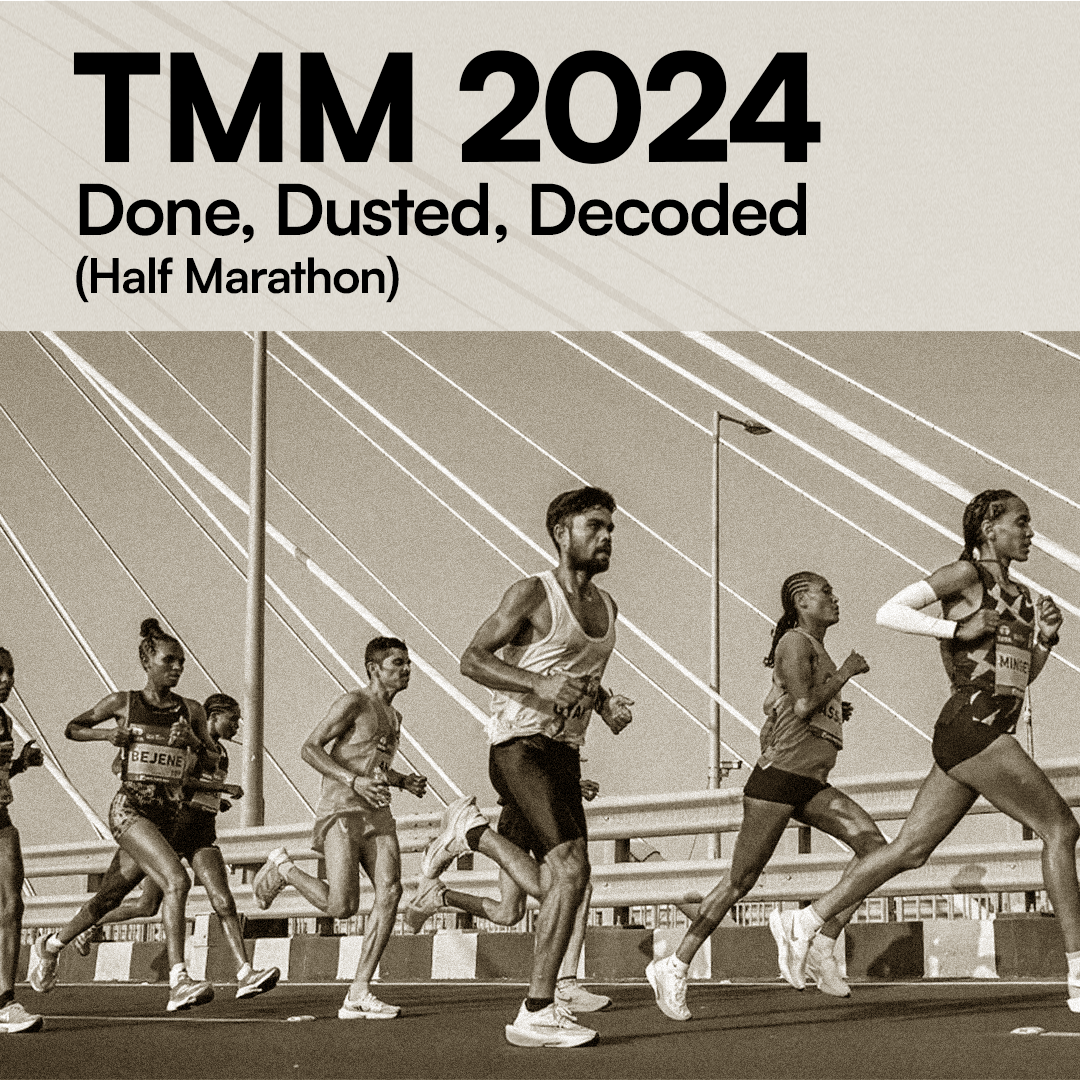
Nutritional Tips to Manage Digestive Issues in Runners

The gut is a vital organ for delivering fluid and nutrients during exercise. Runners may often experience digestive problems or gastrointestinal (GI) distress. Research suggests that 30%–90% of athletes experience GI complaints, which impairs their performance and training. This condition is also known as stomach trouble/runner’s stomach. Here are the causes and symptoms of GI issues/runner’s stomach along with the nutritional ideas to manage these concerns.
Causes of GI issues/runner’s stomach
Three primary causes of GI problems are physiological, nutritional, and mechanical factors.
Physiological factors causing GI issues/runner’s stomach
A major physiological cause of GI distress/runner’s stomach is the reduction in blood flow to the visceral organs during exercise. Other factors include decreased gastric motility (the ability of the gut to contract) and emptying. This causes increased water content in the gut and excess gas production due to the fermentation of food by bacteria. Moreover, you may notice impairment of the barrier function of the gut.
These physiological effects are intensity-dependent, so they get worse if you exercise more. So the gut can become more porous or leaky, potentially allowing pathogens to cross into the bloodstream. The decreased motility of the gut can also result in gastric reflux during exercise. This may lead to backflow of stomach acid into the esophagus that typically causes heartburn.
Nutritional factors leading to GI issues/runner’s stomach
Foods that contain highly concentrated carbohydrate solutions, fiber, protein, fat, and fructose are responsible for the worsening of GI symptoms. But there is a lack of complete understanding regarding this at present.
Mechanical factors resulting in GI issues/runner’s stomach
Lastly, mechanical factors include posture and the impact that you endure during the prolonged running activity. The repetitive gastric jostling during running causes mechanical trauma to the gut and is likely responsible for flatulence and diarrhea. The only known method to reduce these unwanted mechanical effects is by training and adapting to this stress over time.
Symptoms of GI issues/runner’s stomach
From the perspective of symptoms, the most commonly reported GI/ runner’s stomach complaints include:
- Flatulence
- Bloating
- Diarrhea
- An urge to defecate
- Burping
- Acid reflux/heartburn
- Abdominal pain/cramps
- Nausea/vomiting
In extreme cases, marathoners and long-distance triathlon competitors have reported blood in the stool in the hours following a competition. These runner’s stomach symptoms can affect performance, not only during competition but also while recovery and adapting to training.
Nutritional strategies to treat GI issues/digestive issues in runners
Following wise nutritional tips along with supplementation can aid in managing digestive issues in runners. This could be as simple as avoiding heavy meals just before your run. Apart from this, you may implement these ideas:
1. Supplement with probiotics
Evidence suggests that supplementation with probiotics may help runners ward off GI symptoms. Probiotics are living microorganisms found in fermented foods (such as yogurt) and cultured milk. They offer beneficial effects for health when consumed in adequate amounts, but the effects seem to be strain-specific.
Study that supports the supplementation with probiotics
A study published in the European Journal of Applied Physiology from Liverpool John Moores University found that supplementation with probiotics for 28 days before a marathon race reduced the incidence and severity of GI symptoms in recreational runners. The probiotics consumed were provided in Lactis (CUL34), a commercially available supplement (tablet). This tablet contains the active strains like L. acidophilus (CUL21), Bifidobacterium bifidum (CUL20), and Bifidobacterium animalis subsp.
Compared to a placebo group, GI symptom severity was lower during the final third of the race. This observation could potentially help performance and maintain pace in the final phases of long-distance races. So if you wish to see any beneficial health effects, then the choice of strains is of utmost importance.
Also read: Nutrition Strategies to Prevent Bonking During a Marathon
Generalized nutritional tips
- Avoiding large amounts of one source of carbohydrate (glucose drinks) during exercise
- Consuming multiple types of carbohydrate (glucose and fructose mixtures) to reduce GI discomfort
You may prepare these drinks yourself by using commercially available powders or buy them as branded products from retailers.
Also read: How to Select a Sports Drink for Running
2. Avoid high-fiber foods
It is advisable to refrain from consuming high-fiber foods in the days prior to a competition/race/marathon. These items take a longer time to digest, and running after eating these foods may result in stomach discomfort.
3. Stay hydrated and do not consume certain medications
Prevent dehydration by consuming drinks that contain lower carbohydrate concentrations. Additionally, avoid taking medications like aspirin and ibuprofen as they may increase gut permeability.
4. Train the gut
As per evidence, it is possible to train the gut to tolerate carbohydrate intake during endurance running.
What do studies state?
A series of Australian studies reported that repetitively challenging the gut daily for two weeks improved GI symptoms and carbohydrate absorption. This study recommended 30g carbohydrate, where powders of glucose and fructose were dissolved in water in a 2:1 ratio after every 20 minutes during a running exercise testing protocol. They also found improvement in running performance when compared with a placebo condition.
Research on the trainability of the gut is still in its early days. But initial signs suggest that it is possible to adapt to new nutritional strategies and training workloads using a process of trial and error. So the most important message from research is to test and retest your nutritional and training strategies to see what works and what doesn’t in terms of GI distress and performance.
References
1. de Oliveira DP, Burini RC, Jeukendrup A. Gastrointestinal complaints during exercise: prevalence, etiology, and nutritional recommendations. Sports Med 2014; 44: S79-S85.
2. Pugh JN, Kirk B, Fearn R, et al. (2018) Prevalence, Severity and Potential Nutritional Causes of Gastrointestinal Symptoms during a Marathon in Recreational runners. Nutrients 2018; 10:811.
3. Shi LH, Balakrishnan K, Thiagarajah K, et al. Beneficial Properties of Probiotics. Trop Life Sci Res 2016; 27: 73-90.
4. Kechagia M, Basoulis D, Konstantopoulou S, et al. Health benefits of probiotics: a review. ISRN Nutr 2013; 481651.
5. Parnell JA, Wagner-Jones K, Madden RF, et al. Dietary restrictions in endurance runners to mitigate exercise-induced gastrointestinal symptoms. J Int Soc Sports Nutr 2020; 17:32.
6. Pugh JN, Sparks AS, Doran DA, et al. Four weeks of probiotic supplementation reduces GI symptoms during a marathon race. Eur J Appl Physiol 2019; 119: 1491-1501.
7. Miall A, Khoo A, Rauch C, et al. Two weeks of repetitive gut-challenge reduce exercise-associated gastrointestinal symptoms and malabsorption. Scand J Med Sci Sports 2017; 28: 630-40.
8. Costa RJS, Miall A, Khoo A, et al. Gut-training: the impact of two weeks repetitive gut-challenge during exercise on gastrointestinal status, glucose availability, fuel kinetics, and running performance. Appl Physiol Nutr Metab 2017: 42: 547-57.













